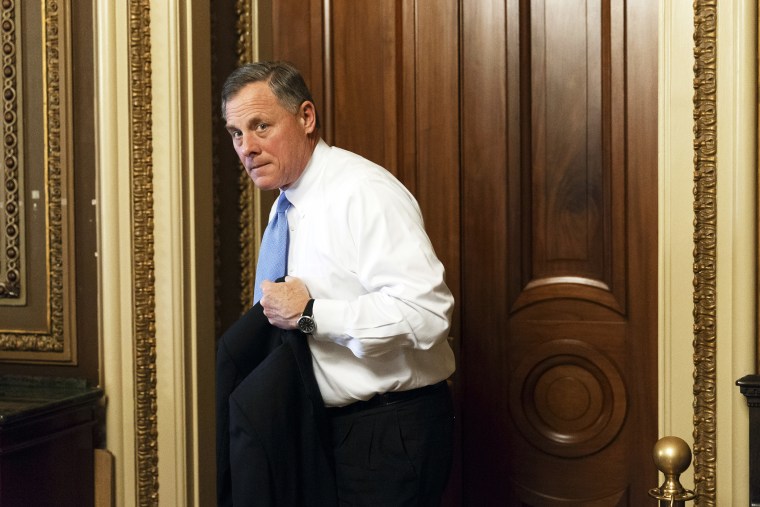The headline certainly sounded good. "G.O.P. Lawmakers Propose Alternative to Obamacare," the
New York Times reported last week, just days after Republican leaders announced that they're finally, after nearly six years, ready to get "
serious" about crafting a health care plan of their own.
And for all the kvetching I do about Republicans and their post-policy tendencies, I should probably congratulate some GOP lawmakers putting pen to paper and unveiling an actual proposal to rival the Affordable Care Act.
But this is roughly where the good news ends.
To significant fanfare, Senate Intelligence Committee Chairman Richard Burr (R-N.C.), Senate Finance Committee Chairman Orrin Hatch (R-Utah), and House Energy and Commerce Committee Chairman Fred Upton (R-Mich.) announced last week they had a "new" health care plan they were each proud to present. And while they received the headlines they wanted, one of the many problems was evident from the very start. Dana Milbank
explained:
Congressional Republicans took a novel approach to announcing their Obamacare alternative this week: Out with the old and ... well, back in with the old. [...] Caroline Behringer, the eagle-eyed press secretary for Democrats on the House Ways and Means Committee, was suspicious that this "urgent" and "explosive" new proposal had just been "devised." So she did some sleuthing and discovered that the Republicans had lifted the thing -- right down to quotes in the news release -- from the rollout of the same proposal a year earlier.
This isn't a joke. A year ago, Burr and Hatch unveiled a health plan with then-Sen. Tom Coburn (R-Okla.). This year, congressional Republicans sent out literally the same press release that they used last year, except they swapped out Coburn's name for Upton's.
In other words, the GOP lawmakers couldn't be bothered to come up with a more credible policy solution -- and they couldn't be bothered to write a fresh press release while touting their "new" plan.
And while that's obviously an embarrassing p.r. mistake, the substance of the "new" Republican alternative to ACA is much worse.
Jason Millman published the most
detailed overview I've seen, but in terms of analysis, don't miss
the report from the Center on Budget and Policy Priorities.
The plan lacks many essential details; there is no legislative language, and the bill's sponsors say they have no plans to produce it for the foreseeable future, thereby leaving the proposal vague in important respects. Nevertheless, it seems clear the plan would: * Result in millions of people losing their existing coverage through the marketplaces and Medicaid by repealing all of health reform's coverage expansions; * Make coverage unaffordable for substantial numbers of low- and middle-income individuals through changes that would significantly raise their premiums, deductibles, and co-payments, likely adding millions of people to the ranks of the uninsured and underinsured; * Eliminate or significantly weaken health reform's consumer protections and market reforms, especially for people aged 50-64 and many people with pre-existing health conditions, thereby placing 50-64 year-olds with modest incomes and people with serious medical conditions at risk of facing high insurance premiums they may not be able to afford; * Leave states with shortfalls in federal Medicaid funding that could cause many poor beneficiaries to become uninsured or underinsured over time; and * Jeopardize employer-based coverage for some people who work at firms with fewer than 100 employees.
There is no Congressional Budget Office score on the Burr/Hatch/Upton report, and there probably won't be -- the sponsors almost certainly don't want to hear what the CBO would have to say.
So why should you care? Because this woeful package is emblematic of the Republicans' broader dilemma: they can't get health care reform right because they don't want to make the kind of choices necessary to create a sound system.
This new-but-not-really-new proposal, the
Huffington Post explained, "is a case study in the difficult trade-offs Republicans would eventually have to negotiate among their members and supporters -- and then defend to the broader public." That's no doubt true -- faced with a menu of choices, these GOP lawmakers were comfortable keeping elements of "Obamacare," but moving the system well to the right, with fewer protections, less coverage, more uninsured, and higher costs.
Put it this way: remove names and party labels from this and the ACA, show it to 1,000 randomly chosen Americans, and ask which system they'd prefer. I suspect the results would be roughly 1,000 to zero. Indeed, Republicans know this all too well, which is why party leaders have encouraged Burr, Hatch, and Upton, but GOP officials
have not and will not embrace their proposal as the party's official response. They can't -- the moment there are two competing alternatives, and they're put side by side, Democrats win the argument.
After the nearly identical package was presented last year, Jonathan Cohn
explained that the proposal's GOP proponents "are acting as if conservatives have some magic elixir for health care problems -- a way to provide the same kind of security that the Affordable Care Act will, but with a lot less interference in the market and a lot less taxpayer money. It's all the goodies of liberal health care reform, they imply, but without the unpleasant parts. They're wrong."
That's as true today as it was then.
